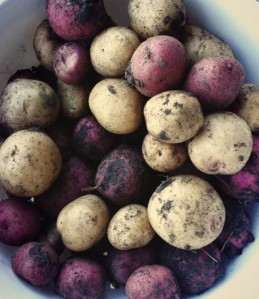 An old friend and I have a saying: “The world would be a much better place if everyone grew their own potatoes.” It’s a political nerd reference to Thomas Jefferson’s belief that those who are close to the land are close to God, and as an extension have a greater appreciation for the importance of our relationship with what the natural world has to offer. It’s a back-to-basics belief that often doesn’t come up in the political or education spheres, but everyone, regardless of faith, stands to gain a lot by getting a little dirt under their fingernails.
An old friend and I have a saying: “The world would be a much better place if everyone grew their own potatoes.” It’s a political nerd reference to Thomas Jefferson’s belief that those who are close to the land are close to God, and as an extension have a greater appreciation for the importance of our relationship with what the natural world has to offer. It’s a back-to-basics belief that often doesn’t come up in the political or education spheres, but everyone, regardless of faith, stands to gain a lot by getting a little dirt under their fingernails.
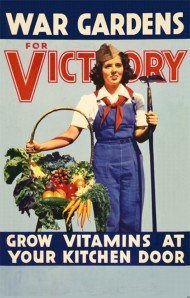 My family has had a garden since we moved to Grand Rapids in 2003, but this year, we decided to go all-out. We’ve jokingly referred to it as our victory garden, harkening back to the WWII years when the average family was encouraged to contribute to the war effort by growing some of their own food. Instead of plopping a few plants in the ground like we normally do, we decided to see just how much our little plot could produce. The result has been just shy of overwhelming, so, victory? Victory.
My family has had a garden since we moved to Grand Rapids in 2003, but this year, we decided to go all-out. We’ve jokingly referred to it as our victory garden, harkening back to the WWII years when the average family was encouraged to contribute to the war effort by growing some of their own food. Instead of plopping a few plants in the ground like we normally do, we decided to see just how much our little plot could produce. The result has been just shy of overwhelming, so, victory? Victory.
We probably put in twice as much stuff as we can handle (i.e. weed), and even picking is a pain sometimes. It’s amazing how prolific our harvests have been considering my parent’s house is in the city and their soil is composed entirely of back-fill from a 1920’s dump. Every spring tilling turns up a fresh harvest of glass, marbles, and an exhausting amount of rocks. Nothing makes you pity the pioneers like carting off your third wheelbarrow of rocks and wondering how anyone ever dealt with 400-lb field stones.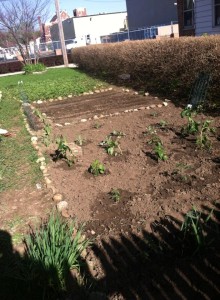 We buy our seeds, plants, and supplies from local, family-owned greenhouses, and we only use organic fertilizers. So we get to pat ourselves on the back for that. Despite adding several bags of compost every year, the soil always looks and feels like garbage. And things grow anyway.
We buy our seeds, plants, and supplies from local, family-owned greenhouses, and we only use organic fertilizers. So we get to pat ourselves on the back for that. Despite adding several bags of compost every year, the soil always looks and feels like garbage. And things grow anyway.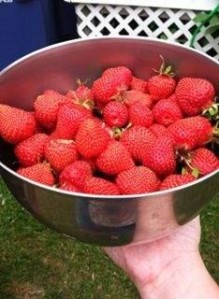 This is our 11th year growing fruit and vegetables, but somehow this year has been different for me. Somehow, it turned into a really important learning experience in which more than ever before I have reflected on everything that goes into growing what I consume.
This is our 11th year growing fruit and vegetables, but somehow this year has been different for me. Somehow, it turned into a really important learning experience in which more than ever before I have reflected on everything that goes into growing what I consume.
Surprisingly, growing my own food this summer has made me more socially conscious than 6 weeks of vegetarianism did. I went vegetarian for Lent this year, thinking that I would gain some insight into the experience of going through the world with limited food options but higher social consciousness. And I was genuinely interested to see if it was a lifestyle that I wanted to adopt. I went out of my way to try all sorts of foods that I’d never had before, and I spent a lot of time researching and reflecting on how meat consumption vastly affects our world. I also thought about how bizarre it is that vegetarians have such a bad rap and how fast food restaurants have so few vegetarian meal options beyond ordering a bunch of side items. (Last I checked, my veg friends’ money is just as green as mine.)
But to be honest with you, I missed meat so bad. I would think about it way more than was reasonable. Meat substitutes only vaguely helped. A lot of them aren’t seasoned in the same way as real meat, which I suspect is a result of vegetarians forgetting what an actual hot dog tastes like. My first omnivore meal on Easter was a Big Mac. . . and McNuggets for dessert. I’m not kidding. I think it’s safe to say that experiment didn’t stick, but if nothing else, I significantly reduced my carbon footprint for 6 weeks.
I did learn some things during that time, but I don’t think it was the enlightening experience that I had envisioned. Maybe the virtues of food production are just too abstract until we seriously engage in the work ourselves.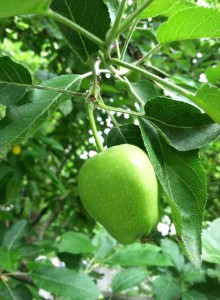 I didn’t expect gardening to turn into such a significant learning experience this summer, but for the first time, I think I’m really starting to get the difficulties and rewards of sustaining oneself. I certainly don’t produce everything I need (I think the neighbors would frown on chickens and goats), but it’s a good start.
I didn’t expect gardening to turn into such a significant learning experience this summer, but for the first time, I think I’m really starting to get the difficulties and rewards of sustaining oneself. I certainly don’t produce everything I need (I think the neighbors would frown on chickens and goats), but it’s a good start.
I’ve taken in a lot of lessons from gardening this year, but some of them have been particularly eye-opening. I think a big part of that has been my greater commitment to experimenting with ingredients and producing my own home-grown versions of prepared foods that are readily available at the supermarket. Additionally, my dad and I have put in a lot of extra effort toward planning and upkeep for maximum yield, a scaled-down version of what people have traditionally done out of necessity. No more dig-a-hole-and-throw-it-in for us.
Here are a few of the most impactful lessons I’ve learned this year:
A small yield requires an incredible amount of labor. Nothing will make you respect a farm wife like boiling 6 cups of tomatoes down to half a cup of ketchup. Don’t get me wrong, for our little urban garden, most of our plants are incredibly abundant. We had so many tomatoes a month ago that we donated 10 pounds of them to a local food pantry. We have kale coming out of our ears. But all of this is a supplementary enterprise for us, a quaint, post-industrial hobby. My head positively spins when I think about how difficult it would be to raise an entire family this way. Growing your own garden is an awesome educational experience for kids. Homeschool families have known this since the beginning of time, and it’s no wonder because of the wealth of subjects that gardening can cover. Aside from all of the obvious science lessons, there are plenty of opportunities for math, reading, writing, art, environment, history, and civics lessons. And while an hour in the garden is more or less exhausting for me, kids can burn off enough energy to come inside and act like normal people for a bit.
Growing your own garden is an awesome educational experience for kids. Homeschool families have known this since the beginning of time, and it’s no wonder because of the wealth of subjects that gardening can cover. Aside from all of the obvious science lessons, there are plenty of opportunities for math, reading, writing, art, environment, history, and civics lessons. And while an hour in the garden is more or less exhausting for me, kids can burn off enough energy to come inside and act like normal people for a bit. One must learn to deal with critters. Don’t tell my folks, but I inadvertently brought four spiders into their house yesterday while cleaning and chopping kale. One of them was so big that I could see the hair on its legs. Some of the wildlife is a little less menacing, though.
One must learn to deal with critters. Don’t tell my folks, but I inadvertently brought four spiders into their house yesterday while cleaning and chopping kale. One of them was so big that I could see the hair on its legs. Some of the wildlife is a little less menacing, though. Cooking a routine meal with fresh-picked veggies now takes roughly forever. Want to make homemade garden-to-table tomato sauce? How rustic! How impressive! But you better do it on the weekend because it’s literally going to take all day. I’m pretty sure my mom was in labor with me for less time. Chopping. Blanching. Peeling. Scalding. Crying. Stirring. Stirring. STIRRING.
Cooking a routine meal with fresh-picked veggies now takes roughly forever. Want to make homemade garden-to-table tomato sauce? How rustic! How impressive! But you better do it on the weekend because it’s literally going to take all day. I’m pretty sure my mom was in labor with me for less time. Chopping. Blanching. Peeling. Scalding. Crying. Stirring. Stirring. STIRRING.
We’re used to the idea of spending all day cooking meat. People will line up around the block for slow-cooked barbeque. Some get giddy over tending a buried-in-the-ground hog. But offer a pal a strip of homemade fruit leather and she’ll be impressed but not jealous when you admit that you heated up your whole house for 9 hours during the dogs days in order to make it.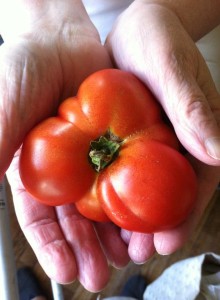 What was once garbage is now gold. It doesn’t really matter how much logic comes into reducing waste. Ease and necessity are the only things that bring us to the tipping point sometimes. Many cities had recycling programs decades ago, but how many people were willing to scrape the labels off of every cotton-pickin’ jar and separate everything into its own bin? If you’re one of those people, mother nature is sending some major brownie points your way. For the rest of us, single-source recycling has made saving the planet nearly as easy as trashing it. In the last ten years, I’m sure that I’ve recycled more than I’ve thrown out.
What was once garbage is now gold. It doesn’t really matter how much logic comes into reducing waste. Ease and necessity are the only things that bring us to the tipping point sometimes. Many cities had recycling programs decades ago, but how many people were willing to scrape the labels off of every cotton-pickin’ jar and separate everything into its own bin? If you’re one of those people, mother nature is sending some major brownie points your way. For the rest of us, single-source recycling has made saving the planet nearly as easy as trashing it. In the last ten years, I’m sure that I’ve recycled more than I’ve thrown out.
Things have begun to go to extremes for me, however. Nothing makes you feel crazy quite like the urge to yell at someone for throwing out a banana peel instead of tossing it into the bucket that goes out to the compost pile. The bruised fruit that you’d never dare buy in the grocery store is now considered perfectly good even if it’s been on the ground for three days. (Cook it, serve it, and nobody will know the difference.) The water you use to wash produce is conserved down to the last drop, even when you live in the Great Lakes State.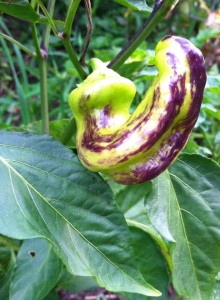 Do NOT look at pictures of Martha Stewart’s garden. It will make you feel bad about your sweet little endeavors. It doesn’t matter how much you rationalize that she has an army of accomplished horticulturalists on staff and an endless supply of landscaping fabric. You’ll look at your efforts and see nothing but the crop of ever-encroaching weeds and wilting radishes. Forget that nonsense. What you’re doing is truly great. You’re helping save the world with that gangly potted tomato plant.
Do NOT look at pictures of Martha Stewart’s garden. It will make you feel bad about your sweet little endeavors. It doesn’t matter how much you rationalize that she has an army of accomplished horticulturalists on staff and an endless supply of landscaping fabric. You’ll look at your efforts and see nothing but the crop of ever-encroaching weeds and wilting radishes. Forget that nonsense. What you’re doing is truly great. You’re helping save the world with that gangly potted tomato plant.
I’ve developed a sense of superiority about organic, locally-grown foods. The alienesque crops that I pick and pull are way more fun and interesting than the perfectly-formed specimens at the supermarket, and they taste better, too. I’ll never again take for granted all of the hard work that local growers put into the goofy produce that they sell at farmers’ markets. Weird and heirloom varieties get serious bonus points. Just harvested too much whatever? Ran out of freezer room? Pickle it! Those folks at Portlandia actually have the right idea. People are unnecessarily intimidated by this. You chop up some crap and throw it in a jar with some vinegar, water, and seasonings. Then you put it in the fridge, no canning needed. Your family and friends will think you’re a genius.
Just harvested too much whatever? Ran out of freezer room? Pickle it! Those folks at Portlandia actually have the right idea. People are unnecessarily intimidated by this. You chop up some crap and throw it in a jar with some vinegar, water, and seasonings. Then you put it in the fridge, no canning needed. Your family and friends will think you’re a genius.  Plants are weird (and a little scary). How is it possible to go from this. . .
Plants are weird (and a little scary). How is it possible to go from this. . .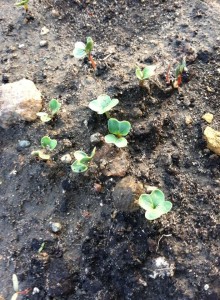 . . . to this. . .
. . . to this. . . . . . in the span of a few months? And even more amazing are the weeds that constantly plague me. I hate them, but I do appreciate their tenacity. You gotta admire something that can’t be killed unless you kill all of the good stuff around it, too. It’s ingenious. I won’t be watching “Little Shop of Horrors” anytime soon.
. . . in the span of a few months? And even more amazing are the weeds that constantly plague me. I hate them, but I do appreciate their tenacity. You gotta admire something that can’t be killed unless you kill all of the good stuff around it, too. It’s ingenious. I won’t be watching “Little Shop of Horrors” anytime soon.
In the end, our garden isn’t exactly a go-for-broke operation. It would be awesome to eat exclusively what we grow for the summer, but if I wasn’t ready for vegetarianism, veganism sounds like a tough sell. Despite that, I feel really good about what we’ve been able to glean from our efforts. I think this garden is winning.
Now more than ever, I have so much respect for the people who have fed themselves and the rest of us for centuries. I’ve also gained huge respect for the horticultural knowledge that is required to make it all work. I wasn’t born with a green thumb, but I’ve been able to scrape together enough practical gardening knowledge to actually pass along to others. And with an endless supply of tips available on the internet, anyone with a pot or a sunny window or a scrap of spare lawn can grow their own food, too. Locally-grown is rightfully all the rage right now, but there’s nothing more local than your own home.
So next year, take the gardening plunge! I promise you’ll learn a thing or two.
Considering putting your own family on the path toward horticultural enlightenment? Here are some simple ways to start:

Your vegies look amazing. Must be so good to be able to eat your own vegies and know how fresh they are.. Awesome!
LikeLike
Thanks so much! Honestly, some of the things that I’ve grown are so pretty that I almost feel bad eating them. Almost.
LikeLike
Good article. If you really want to be like the old settlers, you need to have enough pickled and dried food for the winter too.
LikeLike
Pingback: An old friend and I - EcoGenics.org